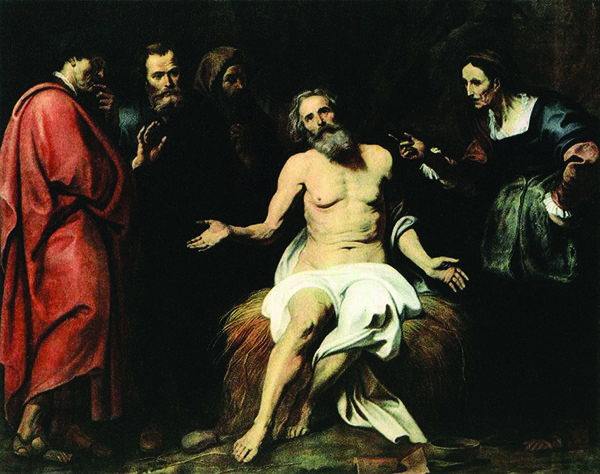The Book of Job often takes pride of place in Lenten reading. It seems fitting to reflect upon Job’s dramatic suffering and struggle during a time of repentance; to meditate on guilt and sin, patience and the reality of just and unjust suffering.
But while partially true, this is also a rather limited view, because there is a deeper core meaning in this perplexing, often disturbing, book of wisdom literature.
Despite its “cosmic” framework and densely poetic language, Job ultimately deals with the same concerns we have during Lent: how we relate to God and, correspondingly, how we relate to our own self. Job’s questioning arises from his need to break out from a strait-jacketed and all-too-convenient model of how one ought to relate to the ultimately unknowable Other, while nevertheless trying to know Him, yearn for Him.
The journey Job makes is the Lenten journey: transforming one’s God from stone into flesh. To do this we have to rid ourselves of limitations that prevent this transformation, limitations stemming from our own static idea of what kind of God is operative in our lives: God alive in our lives, not simply as a giver of law but as One who graciously and gratuitously gives and sustains creative life?
Job is a righteous man. He follows all the laws of God, is good to the poor, genuinely pious, well-respected for his wisdom. The good things in his life are considered, both by him and his society, as signs of this righteousness. According to the theology of the time, God gives the good things in life only to those of true piety, those who follow the law. These good things are indicative of one’s moral and religious worth.
One day this is all taken away — wealth, family, respect, and Job is left ill and desolate. His friends tell him that he must have done something wrong, failed God in some way, because he is being punished.
Job vehemently denies this accusation — he knows he is a righteous man. What he does not understand or know is why he is suffering. He rails and rants in order to comprehend the incomprehensible: Why has God done this to him?
But the reader also knows this entire setback to Job was instigated by the “adversary,” who wants to prove to God that Job is righteous only because he has everything he wants. “Skin for Skin” the adversary states: Take all these good things away and Job will curse God.
God, though, defends his servant Job, and certain that Job is truly righteous he accepts the challenge. God permits chaos to reign in Job’s life. While not cursing God, as the adversary said he would, Job demands to speak with God. He demands God defend Himself, because it is God who has broken the long-established covenant based on retributive justice: you get what you deserve.
Job no longer knows God, and consequently no longer knows himself. He needs to find out what is needed for true wisdom.
Yahweh’s answer is too often depicted as that of a cosmic bully. What the Creator says to Job, out of the whirlwind (in some of the most spectacular poetry of the Old Testament) is that God is not boxed into any category, that He is beyond any understanding.
God states Job is, in fact, correct in defending himself as truly upright and just. But you can’t know or relate to God by following a set of laws — you have to open yourself up to the Divine Mystery, to the mystery of relationship. God is not controlled through rigid and life-denying orthodoxy which exists only to sustain a status quo. God is not static, and neither should our relationship with Him be static.
And this is also the challenge we face in Lent. As Job had to redefine his understanding of both God and self, so must we allow God to define Himself in a suffering Messiah, and not limit Jesus with our preconceptions. With Job we must learn to say, “I uttered what I did not understand, things too wonderful for me, what I did not know. I had heard of you by the hearing of the ear, but now my eyes see you” (Job 42: 3, 5).
Benedictine Father Aelred Niespolo, a monk of St. Andrew’s Abbey in Valyermo, teaches in the pre-theology and theology program at St. John’s Seminary, Camarillo. This is the fifth article in a series.

